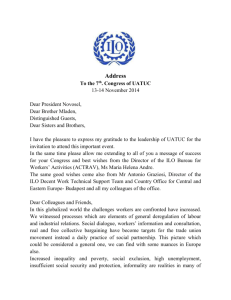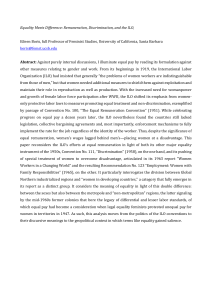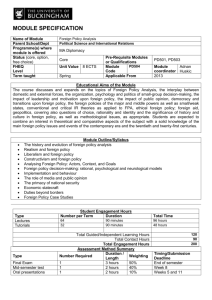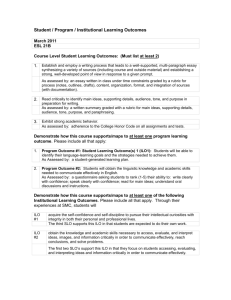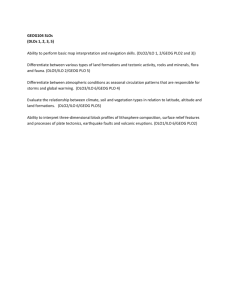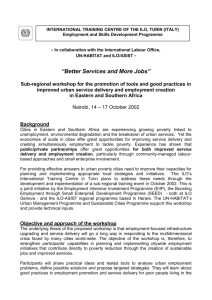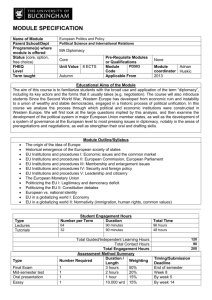Dr Tabani - Mersey Care NHS Trust
advertisement
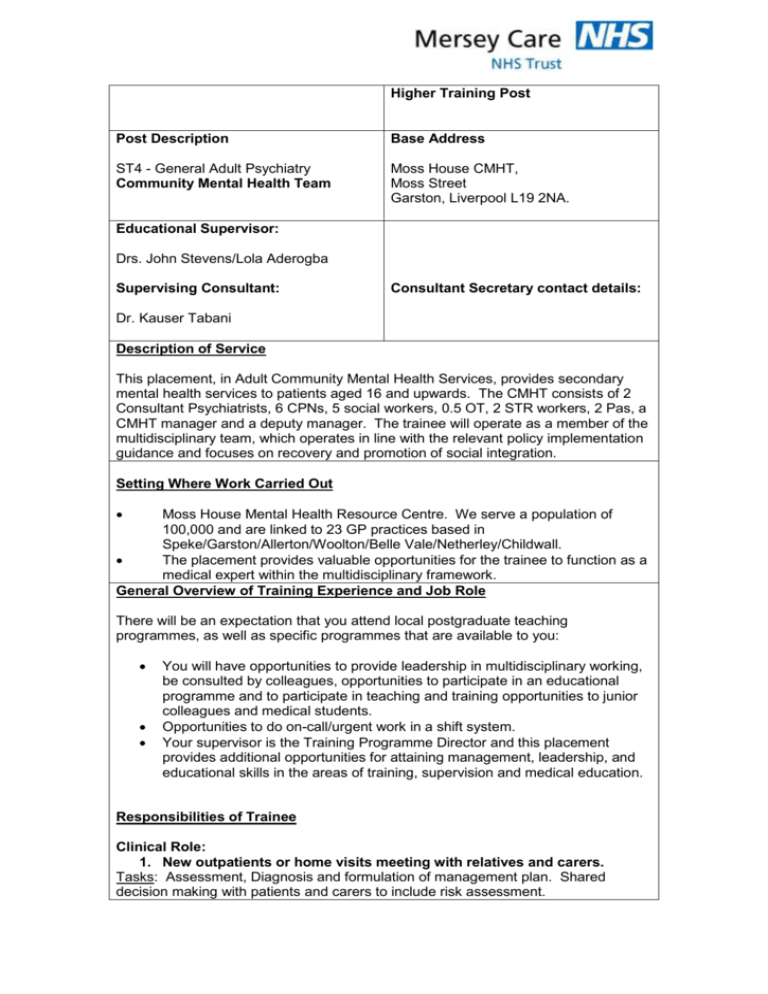
Higher Training Post Post Description Base Address ST4 - General Adult Psychiatry Community Mental Health Team Moss House CMHT, Moss Street Garston, Liverpool L19 2NA. Educational Supervisor: Drs. John Stevens/Lola Aderogba Supervising Consultant: Consultant Secretary contact details: Dr. Kauser Tabani Description of Service This placement, in Adult Community Mental Health Services, provides secondary mental health services to patients aged 16 and upwards. The CMHT consists of 2 Consultant Psychiatrists, 6 CPNs, 5 social workers, 0.5 OT, 2 STR workers, 2 Pas, a CMHT manager and a deputy manager. The trainee will operate as a member of the multidisciplinary team, which operates in line with the relevant policy implementation guidance and focuses on recovery and promotion of social integration. Setting Where Work Carried Out Moss House Mental Health Resource Centre. We serve a population of 100,000 and are linked to 23 GP practices based in Speke/Garston/Allerton/Woolton/Belle Vale/Netherley/Childwall. The placement provides valuable opportunities for the trainee to function as a medical expert within the multidisciplinary framework. General Overview of Training Experience and Job Role There will be an expectation that you attend local postgraduate teaching programmes, as well as specific programmes that are available to you: You will have opportunities to provide leadership in multidisciplinary working, be consulted by colleagues, opportunities to participate in an educational programme and to participate in teaching and training opportunities to junior colleagues and medical students. Opportunities to do on-call/urgent work in a shift system. Your supervisor is the Training Programme Director and this placement provides additional opportunities for attaining management, leadership, and educational skills in the areas of training, supervision and medical education. Responsibilities of Trainee Clinical Role: 1. New outpatients or home visits meeting with relatives and carers. Tasks: Assessment, Diagnosis and formulation of management plan. Shared decision making with patients and carers to include risk assessment. Intended Learning Outcomes: ILO 1: Be able to perform specialist assessment of patients and document relevant history and examination on culturally diverse patients to include: Presentation of main complaint History of present illness Past medical and psychiatric history Systemic review Family history Socio-cultural history Developmental history ILO 2: The doctor will demonstrate the ability to construct formulations of patients’ problems that include appropriate differential diagnoses, liaising with other specialists and making appropriate referrals. ILO 3: The doctor will demonstrate the ability to recommend relevant investigation and treatment in the context of the clinical management plan. This will include the ability to develop and document an investigation plan including appropriate medical, laboratory, radiological, socio-cultural and psychological investigations and then to construct a comprehensive treatment plan addressing biological, psychological and socio-cultural domains. ILO 4: Based on a comprehensive psychiatric assessment, demonstrate the ability to comprehensively assess and document patient’s potential for self-harm or harm to others. This would include an assessment of risk, knowledge of involuntary treatment standards and procedures, the ability to intervene effectively to minimise risk and the ability to implement prevention methods against self-harm and harm to others. This will be displayed whenever appropriate, including in emergencies. ILO 14: To ensure that the doctor is able to inform and education patients effectively. 2. Follow-up outpatients or home visits. Tasks: Ongoing review of formulation and management plans. Shared decision making with patients and carers, to include updating risk assessments where appropriate. Intended Learning Outcomes: ILO 1: Be able to perform specialist assessment of patients and document relevant history and examination on culturally diverse patients to include: Presentation of main complaint History of present illness Past medical and psychiatric history Systemic review Family history Socio-cultural history Developmental history ILO 2: The doctor will demonstrate the ability to construct formulations of patients’ problems that include appropriate differential diagnoses, liaising with other specialists and making appropriate referrals. ILO 3: The doctor will demonstrate the ability to recommend relevant investigation and treatment in the context of the clinical management plan. This will include the ability to develop and document an investigation plan including appropriate medical, laboratory, radiological, socio-cultural and psychological investigations and then to construct a comprehensive treatment plan addressing biological, psychological and socio-cultural domains. ILO 4: Based on a comprehensive psychiatric assessment, demonstrate the ability to comprehensively assess and document patient’s potential for self-harm or harm to others. This would include an assessment of risk, knowledge of involuntary treatment standards and procedures, the ability to intervene effectively to minimise risk and the ability to implement prevention methods against self-harm and harm to others. This will be displayed whenever appropriate, including in emergencies. 3. Urgent or on call reviews, Mental Health Act work Tasks: Meeting the requirement of emergency work, community treatment orders and assessment of capacity. Urgent assessments with diagnosis and formulation of management plans including risk assessments and mental health act work. Intended Learning Outcomes: ILO 4: Based on a comprehensive psychiatric assessment, demonstrate the ability to comprehensively assess and document patient’s potential for self-harm or harm to others. This would include an assessment of risk, knowledge of involuntary treatment standards and procedures, the ability to intervene effectively to minimise risk and the ability to implement prevention methods against self-harm and harm to others. This will be displayed whenever appropriate, including in emergencies. ILO 7: Develop the ability to carry out specialist assessment and treatment of patients with chronic and severe mental disorders and to demonstrate effective management of these disease states. ILO 11: Demonstrate the knowledge, skills and behaviours to manage time and problems effectively. 4. Multidisciplinary patient reviews Tasks: CPA reviews MAPPA meetings Risk reviews Intended Learning Outcomes: ILO 4: Based on a comprehensive psychiatric assessment, demonstrate the ability to comprehensively assess and document patient’s potential for self-harm or harm to others. This would include an assessment of risk, knowledge of involuntary treatment standards and procedures, the ability to intervene effectively to minimise risk and the ability to implement prevention methods against self-harm and harm to others. This will be displayed whenever appropriate, including in emergencies. ILO 7: Develop the ability to carry out specialist assessment and treatment of patients with chronic and severe mental disorders and to demonstrate effective management of these disease states. ILO 9: To demonstrate the ability to work effectively with colleagues, including team working. 5. Team meetings Tasks: Communication about patients and carers, planning, organisational policies and objectives. Intended Learning Outcomes: ILO 9: To demonstrate the ability to work effectively with colleagues, including team Working. ILO 10: Develop appropriate leadership skills. ILO 13: To develop an understanding of the implementation of clinical governance. 6. Clinical advice to team members Task: Regular or adhoc supervision on clinical matters. Intended Learning Outcomes: ILO 10: Develop appropriate leadership skills. ILO 15: To develop the ability to teach, assess and appraise 7. Liaison with colleagues and other services. Task: Speaking with other professionals involved in patient care – primary care, other specialities. Intended Learning Outcomes: ILO 9: To demonstrate the ability to work effectively with colleagues, including team Working. Leadership Role: lead clinical roles, eg. audit, risk, patient safety, mental health act work, information governance etc. Tasks: Provide leadership roles for specific and defined areas of practice. Work place based assessments, participation in clinical supervision of junior trainees and medical students. Intended Learning Outcomes: ILO 10: Develop appropriate leadership skills. Educational and Academic roles: Teaching and supervising junior trainees and medical students. Meetings requirements for revalidation. Participation in academic programmes organisation of junior trainee/medical student programmes Tasks: Revalidation activities, quality improvement activities and reflections. Presentation and or attendance at educational meetings. Intended Learning Outcomes: ILO 15: To develop the ability to teach, assess and appraise ILO 17: Ensure that you act in a professional manner at all times ILO 18 To develop the habits of lifelong learning ILO 15: To develop the ability to teach, assess and appraise ILO 5: Based on the full psychiatric assessment, demonstrate the ability to conduct therapeutic interviews; that is to collect and use clinically relevant material. The doctor will also demonsotrate the ability to conduct a range of individual, group and family therapies using standard accepted models and to integrate these psychotherapies into everyday treatment, including biological and socio-cultural interventions Special interest:- the trainee will have opportunity to work up to two sessions in a field of their special interest. Intended Learning Outcome: ILO 16: To develop an understanding of research methodology and critical appraisal of the research literature The Trust provides special interest opportunities which are varied and include psychotherapy, drug dependency, research, Masters programme etc. The trainee will receive one hour of trainee centred educational supervision per week in addition to clinical supervision as and when needed Please see the Handbook for your area at: http://www.merseycare.nhs.uk/Working_for_Us/Medical_Trainees/Junior_Doctors_H andbooks.aspx Trainee timetable: Day Monday Tuesday Wednesday Thursday Friday AM Clinic with Dr Tabani Academic Special Interest Clinic with Dr. Tabani Clinic with Dr. Sedgwick PM Clinic with Dr. Sedgwick MDT Clinical Admin. Special Interest 1-2 Supervision 3-5 Home Visits / Clinical Admin
